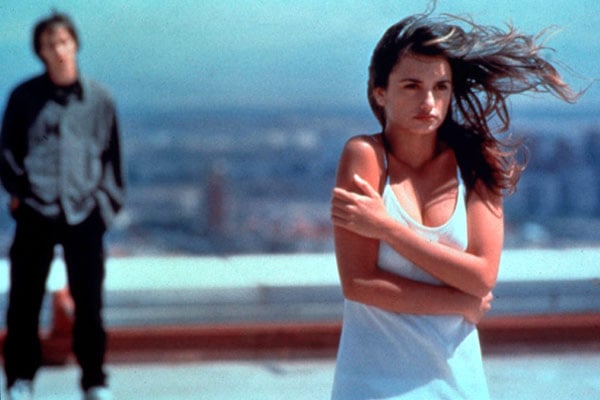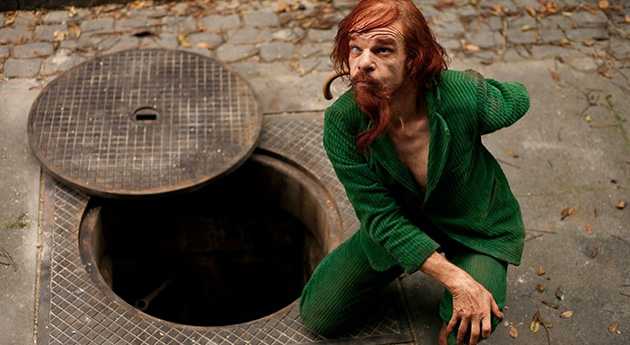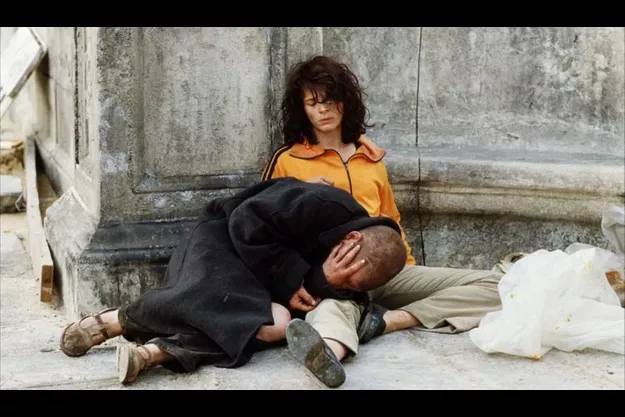Great job, Thursday!
I know I'm only scratching the surface, I feel I've thought enough about what
Persona means to me to at least open up a discussion. I'm going to shoot the works and put this out as a thread instead of posting it in Movie Tab II. I've noticed a few people listing it amongst their fave movies, even if many of these members seem to be long gone. My main desire in starting a thread is that I don't want to have to keep linking to my original post when I come up with some more specific ideas (perhaps even this week), plus I'm hoping that enough people share their ideas to make it worthy of a discussion.
I'm going to try to make this first post as free of spoilers as possible, but this is the kind of discussion which will lend itself to interpretations of specific actions shown in the movie even if their meaning is unclear. In other words, the theme and "plot" are so open to interpretation that maybe there are no spoilers!
Let me get out of the way what semblance of a plot there is here first. I'm not going to go into too many details because that would be spoiling, but I'm going to discuss what I think the "apparent" plot is. Elisabeth (debuting Liv Ullmann) stops speaking in the middle of a stage performance of
Elektra, and she's subsequently taken to a hospital where it's determined that she's physically healthy and may be suffering from something psychosomatic. Either way, she still cannot or will not speak. Outgoing nurse Sister Alma (Bibi Andersson) agrees (perhaps against her better judgment) to accompany Elisabeth to a remote island home where the doctor hopes that Alma's personality will draw out the now-mute actress's voice. Along the way, mysterious things happen, which may be fantasy, dreams or reality. In fact, there may be only one woman on the island, but if there is, which one is it?
Most of the discussions which I've seen about
Persona seem to start off with the concept that the film is somehow about transference and is crammed with Freudian imagery, especially in the opening, closing and midway sections. Now, I want to keep those interesting, legitimate ideas in the bank account, so to speak, and
spend my initial post discussing that I think there is an even more overriding concept found in the film. Most of the mysteries which the film seems to conceal (more than it reveals) involve communication between people. Now, it's true it could be communication between the two central characters in the film, who are set up to be very similar yet utterly different (or perhaps even two halves of the same person). It can just as easily be communication by any artist who is trying to connect with the audience, and the audience's capability of understanding what the artist intends. Here the artists would be writer/director Bergman and his cinematographer, the incredible Sven Nykvist. I want to bring this up because of the way the film begins and ends with the arc light of the film projector coming on and turning off. The film goes out of its way to tell you that it's a movie, but immediately the viewer seems to be confused, if not at what is being shown, then why it's being shown and what its meaning is.
While it's true that the seemingly-surreal images at the beginning concern sex, violence and death, they also produce some stirrings of life. A boy, who seems to be in a morgue, awakens to find blurred images on a white wall of the two lead characters. Later in the film, "both" women discuss (although only one talks) past experiences concerning their "children". I can accept the young boy as either or both of the women's sons, but I can also see him as a young Ingmar Bergman, straining to make out images on a wall which he feels he is unable to communicate with his audience. This way, the meaning of what happens in the film "proper" can be interpreted in more than one way and still work for the viewer. However, I believe that the easiest way for a viewer who finds
Persona or most of Bergman impenetrable is to look at the "weird" scenes as a cry from an artist, or any human being, for that matter, for someone to try to understand his/her message, theme, art and accept it on a personal level. Most art is going to be appreciated by the viewer far more readily than how the artist sees it. The artist just hopes that someone can feel what they are expressing. If they can't feel, maybe their "intelligent admiration" will suffice, but a total rejection is often felt like a sharp knife.
Ultimately, I find
Persona to be an initially bewildering movie which opens up upon subsequent viewings. I appreciate the various interpretations which have been passed down for forty-odd years. I watched the film for the first time in the mid-1970s at college, and I felt lost at sea, especially when some of my fellow classmates pontificated pretentiously about its "true" meanings. (You must remember that we watched the movie once, in 16mm. No VCRs, no DVDs, etc.) I now realize that my classmates had no more concept of what the film may be about than I did or even do now, although I truly believe I can find many more complex meanings for what happens in the film. For example, it's often stated as fact that the Elisabeth character only speaks once in the film, but I would have sworn that I heard her speak at least twice, and quite possibly three times. In fact, I will also swear that one of the times that Alma is supposed to have spoken, it definitely wasn't her, and if it wasn't her and it wasn't Elisabeth, who was it? Whether you like it or not, maybe we can agree that
Persona is a trip.
Looking back at my original post, I must have made enough misstatements of fact to qualify me as a Presidential/Vice Presidential candidate.
Here they are:
1. Elisabeth is not considered to be suffering from anything psychosomatic. It appears to be a personal choice for her not to speak.
2. The doctor says that Elisabeth did "apologize" (apparently by voice) after the incident at the theatre, but she stopped talking again soon enough.
3. They don't go to an island; they go to a seaside home.
4. It's so difficult to determine who speaks during the following scenes: 1) The scene at the table where Alma is either told, or "hears" that she shouldn't go to sleep at the table"; 2) The scene where Alma is ready to throw boiling water on Elizabeth. Who cried out not to do it?; 3. The scene where Elizabeth unequivocally talks. Why did she do it? It was in the hospital, after all. Was it a flashback, a dream or a fantasy?
I also need to know if Elisabeth left her letter unclosed for a reason. Why were the points of this letter shown in isolated paragraphs? Why did Elizabeth's husband not recognize her as being different from Alma? I explained to Sarah that Elizabeth possessed Alma, but it didn't fully explain what was going on in that scene. In fact, Sarah asked me if her husband was blind because he pulled off sunglasses and couldn't seem to know who his wife was, but he did seem to know where to kiss her, so I rejected that idea.
Seven Samurai is my #11.

Cyrano de Bergerac (Jean-Paul Rappeneau, 1990)
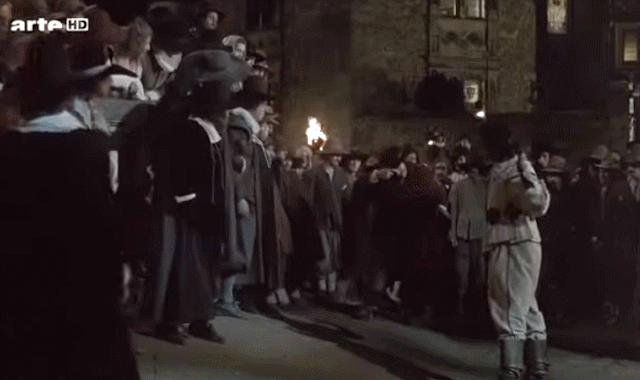
Edmond Rostand's
Cyrano de Bergerac is one of my favorite plays and one of my fave movies. There have been some good films based on it. The awesome José Ferrer won his only Oscar for the low-budget, yet high-entertainment, 1950 version. Steve Martin gave one of his best performances and did one of his best scripts for the wonderful
Roxanne (1987).
But my favorite version is undoubtedly the French version where Gerard Depardieu gives one of film's most memorable performances. From the opening scene, the play starring the pompous idiot actor, you know you are witnessing something special. First off, even if the film fibs in its depiction of the way the gigantic candelabras are all lit by hand and then pulled up by rope to light the theatre (and I don't know if it does), that's the way I would want to see the scene staged. Depardieu is incredible spouting Rostand's poetry (subtitled in English by
A Clockwork Orange's Anthony Burgess), full of so much wit, and then he immediately has to duel AND defeat AND escape from a group of overarmed fops who couldn't possibly recognize a real man.
For me, Depardieu is mindboggling, whether he's being witty, excelling at physical activity, or (especially) pouring his heart out to the love of his life Roxane (Anne Brochet), whether subtly expressing himself as a possible lover to her or heartbreakingly pitching the young soldier Christian (Vincent Perez) she dearly falls in love with at first sight. The balcony scene where Cyrano speaks his heart to Roxane, during a storm, while pretending to be Christian, ranks with the opening scene for virtuosic filmmaking and acting. The film continues with another jealous lover who tries to ruin both Cyrano and Christian, by sending them off to war, but it all culminates in a moving finale where everything becomes very tragic, yet still beautiful.
Jesus of Montreal (Denys Arcand, 1989)
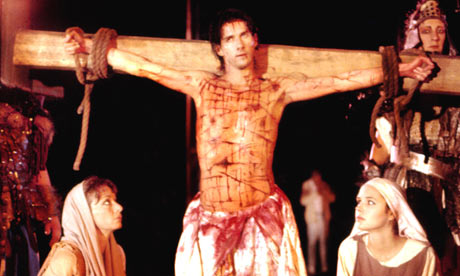
Beautiful, thought-provoking, irreverent, haunting, funny, sexy and deeply moving are all words I use to describe what I consider the greatest Jesus film ever made,
Jesus of Montreal. It's set in present-day Montreal where a group of actors get together to put on an updated version of the Passion on the grounds of a Catholic church. The troupe's ostensible leader, Daniel (the incredible Lothaire Bluteau), who is to play Jesus, begins the film recruiting his apostles and before long it becomes apparent that almost everything which is happening in real life is a mirror of the Passion Play and the Gospels, often in strikingly original ways. Director/writer Arcand looks at things from many perspectives so you can never be sure what his personal agenda is, but one thing is for sure and that's if you're a believer, you should be able to put Jesus's life into a more-modern and personal context. If you hate "religious" movies, you will quickly see that this is not a religious film at all, yet it doesn't shy away from showing a powerful Jesus (both Biblical and "actor") who is totally capable of performing miracles which affect people's lives in the here and now. It's a wonderful film which seems to accomplish the impossible by presenting a potentially-polarizing subject in a very inclusive way. I think it can only disappoint the most-fundamentalist of churchgoers, but it will reward those with open hearts and minds. Besides that, it's damn entertaining. Two of my fave scenes are the low-budget special effects presentation of the beginning and ending of the world and the hilarious scene of dubbing a porno movie. However, it's the night-time Passion Play itself, which is so hypnotic and causes Daniel and his followers to get in trouble with the Catholic Church even though it's critically acclaimed and loved by the audiences.
My List
1.
War and Peace
2.
Z
3. Jesus of Montreal (Did Not Place)
4. Cyrano de Bergerac (1990) (Did Not Place)
5.
Downfall
6.
Night and Fog
7. Entr'acte (Did Not Place)
8.
Pan's Labyrinth
9. Tell No One (Did Not Place)
10.
Parasite
11.
Seven Samurai
12. Allegro non troppo (Did Not Place)
13.
Nausicaä of the Valley of the Wind
14. Letters from Iwo Jima (Did Not Place)
15. The Shop on Main Street (Did Not Place)
16. The Discreet Charm of the Bourgeoisie (Did Not Place)
17.
The Celebration [Festen]
18. Underground (Did Not Place)
19. My Father's Glory - make sure to watch My Mother's Castle since it's Part 2 of the same film (They Both Did Not Place)
20. The Marriage of Maria Braun (Did Not Place)
21.
The Umbrellas of Cherbourg
22. Europa Europa - should have been Olivier, Olivier (They Both Did Not Place)
23. Love Exposure (Did Not Place)
24. Buffet Froid (Did Not Place)
25.
Das Boot




 And also, 22 lists, which is second to Parasite's 23. So that pretty much settles why Seven Samurai reigned supreme.
And also, 22 lists, which is second to Parasite's 23. So that pretty much settles why Seven Samurai reigned supreme. Check out my podcast:
Check out my podcast: 





